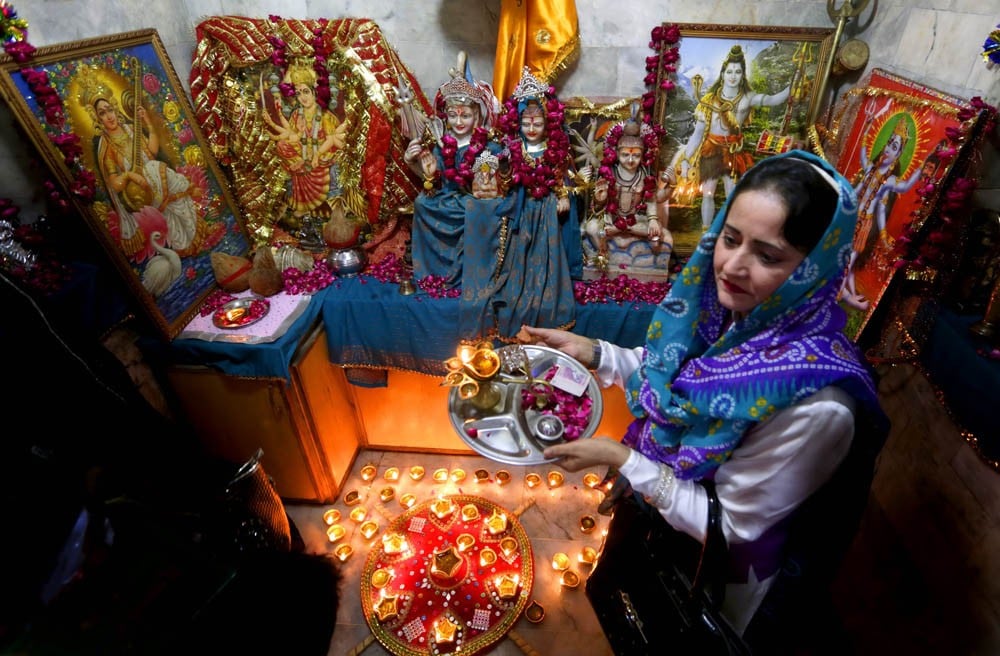
On the night of Diwali, Lahore played a perfect host to its minority Hindu community

October ended with the colour adorned celebration of Diwali, a Hindu festival, in different parts of Lahore.
While on the one hand, every coffee-table chat has been around the country’s politics, our tense relations with India, and the upcoming US presidential elections, the temples of the city were recently lit with clusters of diyas (clay lamps) in an age-old tradition to celebrate the victory of light over darkness.
Krishna Mandir, perched on the busy Ravi Road, stood majestic with tiny LED lights. Rows of chairs greeted the guests and a rosy perfume pleasantly filled the air.
Even though Karachi has been glorified as being the melting pot for different ethnicities of Pakistan, on the night of Diwali, Lahore played a perfect host to its minority Hindu community. The city, with its rich cultural history, an undeniable zest for festivities and food, is precisely the place to enjoy the positivity associated with the event.
Krishna, although not so grand a temple, holds a great significance for Hindus in the city, as it is one of the few functional mandirs around.
Traditionally, Diwali is celebrated by Hindus across the world in honour of the return of Lord Rama, his wife Sita and his brother Lakshmana from a 14-year exile after Rama defeated Ravana. In other words, it is about the combat between good and evil, the former transcending the latter.
It turned out to be an evening of diyas, with 100-plus persons, the women sporting banarsi saris of striking colours, mostly plain golds and purple, and the sparkling Kundun jewellery.
The person who welcomed the arriving parties Syed Faraz Ahmed said on the occasion, "Respecting the traditions and practices of all groups living in a society regardless of the religious or ethnic divisions is what can create a truly homogenous communal life."
His statement was soon followed by a recitation of Bulleh Shah’s kalaam by a Hindu pilgrim. The lines simply dissolved in the ambience and their utter magnificence rejuvenated one’s belief in the spirit of goodwill and eternal love.
For a perfect stranger like myself, it was nothing short of bewitching to see the way in which the bhajans were punctuated by the melodious vocals of Benjamin Sisters as they crooned, "Iss percham kay saaye taley hum aik hein…"
In the words of Rajkumari, an old lady who had come all the way from Peshawar to celebrate the festival with her friends in the city, "Diwali shows that no matter how powerful the evil may think it is, as long as we strive for good, it will be defeated."
Naheed Fakhar, a professor at National College of Arts (NCA), who was visiting the temple for the very first time, also spoke to TNS. She said, "It is amazing how a festival adds exuberance to the mundane life of a city. The colourful festival [of Diwali] creates a sense of togetherness which is extraordinary."
A little shuffling in the seating indicated the arrival of some important guests. Their arrival was preceded by a gigantic container of milk which had been brought at the temple as an offering.
Families and children were having the time of their life. Introductions were being made, and greetings exchanged. People were chanting "Happy Diwali!" and "Diwali Mubarak!" The ladies received ‘shagun’ from the male members. Thousand rupee notes were handed out to sisters by their doting brothers.
"Almost a week ahead of the festival, we start to clean our houses, draw rangoli patterns at the entrances, and make decorative arrangements at the temples," the priest of the Krishna Mandir said.
The festivities continued till late in the evening. Guests were thanked and wishes were made for everyone’s prosperity.